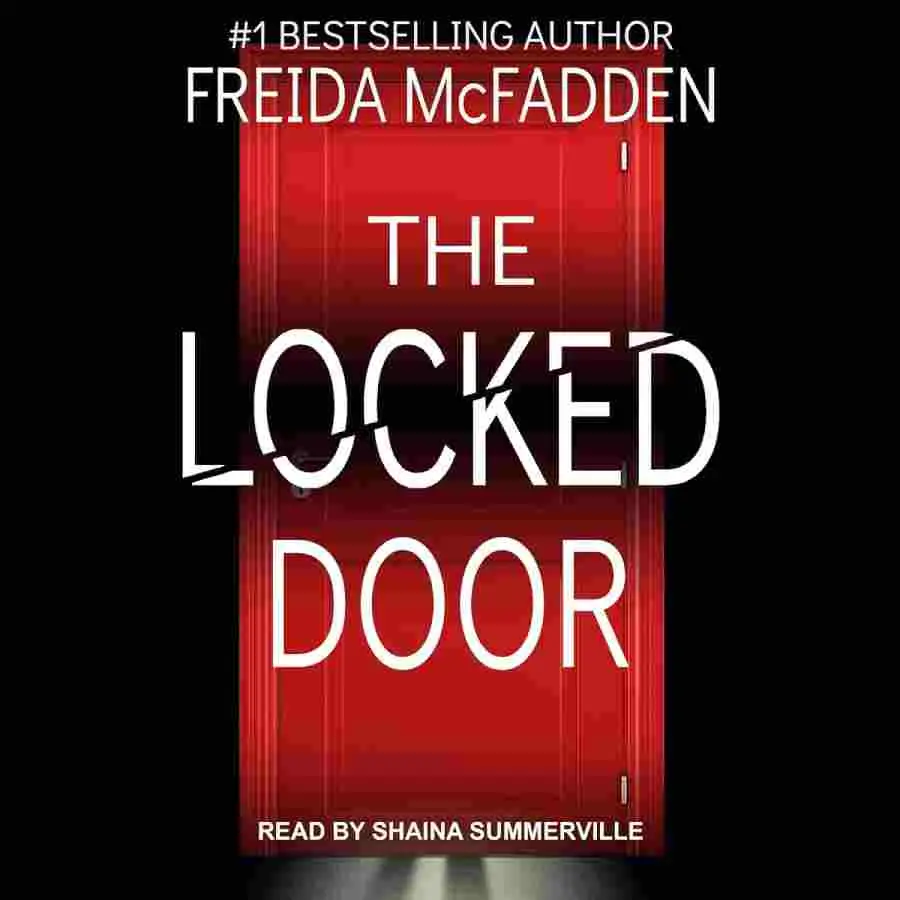

As an enthusiastic reader and longstanding admirer of psychological thrillers, I’m constantly on the lookout for the next novel that promises restless nights and gripping suspense. My most recent venture into this genre brought me to The Locked Door by Freida McFadden, a literary sensation known for her ability to weave scary, pulse-pounding novels. Given the excitement around this book, it seemed like an excellent choice for my next review.
I like thrillers that make me rethink what I know about the characters and the tale. The pleasure of being led down a road just to have the rug yanked out from under me is what keeps me going back for more. The Locked Doorprovided just that—a labyrinth of secrets, deceit, and a heroine tortured by her father’s heinous history. This is not the first McFadden book I’ve read, and based on my experience with The Locked Door, it won’t be the last.
Comparing The Locked Door to other thrillers I’ve read, I can’t help but think of Gillian Flynn’s Gone Girl. While Flynn’s book is darker and more focused on the complications of marriage, McFadden’s novel delves deeply into the psychological horror of nature vs nurture—a concept that adds a new level of drama to the story. Both stories, however, have the similar theme of keeping the reader wondering until the very end.
Plot Overview
The Locked Door is the tale of Dr. Nora Davis, a successful and apparently collected surgeon whose history is far from average. Nora was only eleven years old when her father, Aaron Naughton, was caught and discovered to be a known serial murderer. His acts were heinous: kidnapping, torturing, and killing young ladies right in the family home. Nora was devastated by this news, which turned her life upside down and forced her to face the truth that her childhood house had been the location of unspeakable tragedies.
Fast forward to the present, and Nora has done all she can to disassociate herself from her father’s sins. She changed her identity, avoided personal connections, and established a successful profession as a surgeon. Despite her best attempts to move on, the past continues to throw a long shadow over her existence. This shadow becomes wider when a young patient of hers is discovered slain in a way suspiciously similar to her father’s method. The eerie connections between the latest crime and her father’s techniques drew Nora back into the horror she thought she’d fled.
What follows is a carefully constructed story about Nora’s internal conflict with her history, her dread of being judged for her father’s actions, and the terrible prospect that she shares more with him than simply his DNA. what the murder investigation progresses, Nora finds herself at the heart of a perilous game in which nothing is what it seems and everyone around her is a possible suspect.
Characters
Freida McFadden has a talent for inventing characters that are both familiar and tragically broken, making them all the more appealing. Let’s take a closer look at the main characters in The Locked Door:
- Nora Davis: Nora is a multifaceted character whose existence is determined by her attempt to reconcile her present and haunted past. She is a character who has constructed mental and physical barriers to shield herself from the world’s judgment. Much of her conduct is motivated by her dread of being recognized as her father’s daughter, which has led her to live in seclusion. However, underneath this façade of control is a lady who is emotionally fragile, always fighting the worry that she has inherited her father’s proclivity for violence.
- Aaron Naughton: Aaron, Nora’s father, represents evil throughout the narrative. Despite being imprisoned for his actions, he has had a significant impact on the plot. Aaron’s character is a disturbing reminder of the atrocities that people can inflict, and his connection with Nora is important to the novel’s examination of nature vs nurture. His presence in the narrative creates a continual sense of tension as Nora struggles with the idea that she is more like him than she wants to accept.
- Detective Aaron Locke: Aaron Locke, a detective assigned to the murder investigation, adds another layer of intricacy to the plot. He is not just an important character in the inquiry, but he also has a personal link to Nora: he was once her high school lover. Their friendship is strained by the past, and as the inquiry continues, old scars reemerge. Locke’s involvement in the plot is crucial, as he serves as both a connection to Nora’s past and a possible ally—or adversary—in her search for the truth.
- Supportive Characters: The story also includes a cast of minor characters, such as Nora’s medical coworkers, her mystery neighbor, and the police detectives working on the case. Each of these personalities contributes to the tension as Nora tries to figure out who she can trust and who wants to ruin her.
Themes & Analysis
The Locked Door is more than simply a thriller; it’s a psychological investigation of some profound and troubling issues that strike a human chord.
- Nature Versus Nurture: One of the novel’s main topics is the issue of whether evil is hereditary or learnt. Nora’s dread of inheriting her father’s violent tendencies drives the plot forward. This issue is portrayed via Nora’s internal monologue and interactions with others, as she continuously wonders whether she is capable of the same horrors as her father. McFadden dives into the psychological pain associated with this anxiety, making it an important component of the novel’s suspense.
- Weight of the Past: The book also investigates the notion that the past is never fully behind us. Nora has spent her life attempting to avoid her father’s legacy, but as the tale progresses, it becomes evident that the past has a way of coming up with us. This issue is especially painful since it impacts Nora’s interactions with others. Her dread of being judged for her father’s misdeeds causes her to live in seclusion, making her more susceptible to what happens.
- Isolation:** Nora’s self-imposed solitude is another key motif in the narrative. Her attempt to keep her history buried has resulted in a life in which she is emotionally isolated from people around her. This seclusion serves as both a defensive strategy and a source of weakness, leaving her without friends when she most needs them. McFadden used this motif to emphasize the concept that solitude, although initially protective, may eventually be detrimental.
- Trust and Betrayal: Trust is a delicate thing in The Locked Door. Nora’s connections are riddled with mistrust, and as the story progresses, it becomes evident that someone close to her is attempting to frame her. The concept of trust and betrayal is brilliantly interwoven throughout the story, keeping readers on edge as they attempt to figure out who is on Nora’s side and who is trying to get her.
Spoilers: Plot Twists and Ending
McFadden masterfully weaves twists and turns throughout the novel, keeping the reader wondering until the finish. One of the most surprising shocks occurs late in the story, when it is discovered that someone close to Nora has been influencing events throughout. This person’s purpose is based on a profound desire for vengeance, which stems from an occurrence in the past that Nora was ignorant of. This revelation not only adds a new depth to the plot, but it also pushes Nora to accept that her acts, no matter how accidental, have repercussions.
The novel’s finale takes place at Nora’s childhood house, where her father committed his horrible acts. This scene is essential since it marks the starting point for Nora’s dreams and the final confrontation with them. The last showdown is dramatic and emotionally fraught, and Nora must use all of her intelligence and strength to survive. Without giving too much away, the finale is both rewarding and unnerving, leaving readers with unanswered issues about justice, morality, and the irreversible nature of the past.
Comparison of Other Works
If you like psychological thrillers, The Locked Door may certainly remind you of other notable works in the category. Gillian Flynn’s Gone Girl comes to mind, with its complicated characters and unexpected turns. While Flynn’s story goes deeply into the darker aspects of marriage, McFadden’s work concentrates on the psychological anguish of inherited guilt and the terror of becoming someone you loathe.
Another parallel might be seen to Paula Hawkins’ The Girl on the Train. Both works include unreliable narrators and a narrative that keeps you wondering until the conclusion. Whereas Hawkins’ work is primarily concerned with memory and perception, The Locked Door focuses on the dread of the past and its ability to alter the present.
Freida McFadden’s literary style is very evocative to Ruth Ware, especially in works like The Woman in Cabin 10. Both writers are skilled at establishing tight atmospheres and developing tension via the protagonist’s inner conflict. However, McFadden’s stories are more straightforward and fast-paced, making them more accessible to a larger audience.
Conclusion: Why You Should Read (or Listen to) “The Locked Door”
Freida McFadden has built a space for herself in the crowded thriller genre, and The Locked Door demonstrates her narrative skill. It’s a book that not only entertains but also prompts reflection and conversation. If you appreciate psychological thrillers with fast-paced plots and unexpected turns, this book is definitely worth your time.
However, if you opt to listen to this narrative as an audiobook, be cautioned that the voice has garnered varied ratings. While the narrative is intriguing, some listeners find the narrator’s manner annoying. If you are very sensitive to narrative style, you may choose to read the book instead.
In the end, The Locked Door is a compelling story that will delight lovers of psychological thrillers and leave them wanting more from Freida McFadden. And if this is your first McFadden book, it will not be the last.


